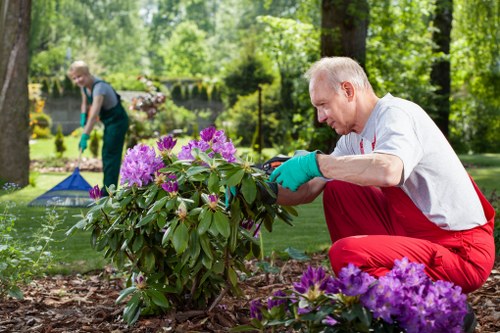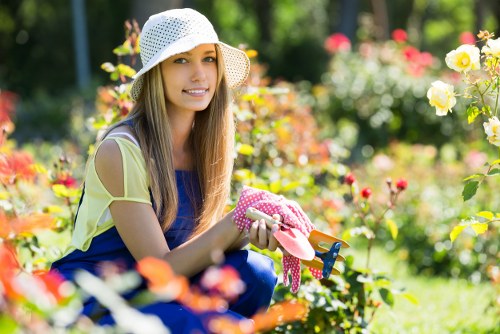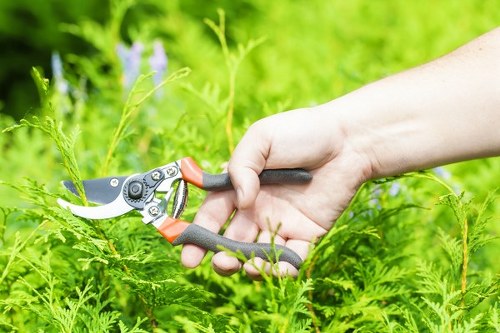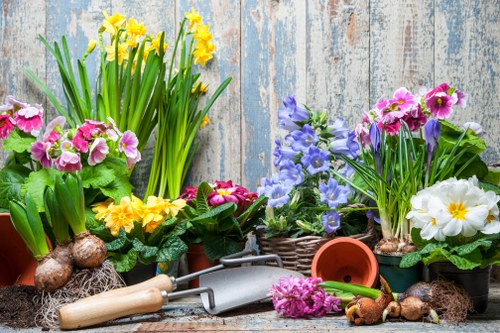Garden Fence Installation North End

Creating a beautiful and functional garden space is a dream for many homeowners in the North End. One of the most effective ways to enhance your garden is by installing a sturdy and stylish fence. A well-installed garden fence not only defines your outdoor space but also provides privacy, security, and aesthetic appeal.
In the North End, the climate and local environment play a significant role in determining the best types of fences for your garden. Whether you prefer traditional wooden fences or modern metal alternatives, understanding the local conditions can help you make an informed decision.
Moreover, a garden fence can serve as a protective barrier for your plants, keeping out unwanted animals and reducing maintenance efforts. Investing in a quality fence ensures that your garden remains a peaceful sanctuary for years to come.

Why Install a Garden Fence?
Installing a garden fence offers numerous benefits that go beyond just aesthetics. Here are some key reasons why a garden fence is a valuable addition to your North End home:
- Privacy: A fence provides a private space where you can relax without worrying about passersby.
- Security: It acts as a deterrent against intruders and keeps children and pets safe within your garden.
- Boundary Definition: Clearly marks the boundaries of your property, avoiding potential disputes with neighbors.
- Wind Protection: Shields your garden from strong winds, creating a more stable environment for your plants.
- Enhanced Curb Appeal: A well-designed fence can significantly boost the visual appeal of your home.
Understanding these benefits can help you prioritize your needs and choose the right type of fence that aligns with your goals.
Additionally, a garden fence can serve as a foundation for other outdoor elements like trellises, lighting, and decorative panels, further enhancing the functionality and beauty of your garden.

Choosing the Right Fence Material
Selecting the appropriate material for your garden fence is crucial for ensuring longevity and maintaining the desired aesthetic. Here are some popular fence materials commonly used in the North End:
- Wood: Offers a timeless and natural look. It's versatile and can be customized to fit various garden styles.
- Vinyl: Known for its durability and low maintenance. Vinyl fences resist weathering and do not require painting.
- Metal: Includes options like aluminum and wrought iron, which provide a modern and elegant appearance.
- Composite: A blend of wood fibers and plastic, offering the look of wood with enhanced durability.
- Chain-Link: A cost-effective option that provides security and visibility.
Each material has its own set of advantages and potential drawbacks, so it's essential to consider factors like budget, maintenance, and the overall design of your garden when making a selection.
For example, while wood offers a classic aesthetic, it may require more frequent maintenance compared to vinyl or metal options. Conversely, metal fences are highly durable but can be more expensive.

Design and Style Options
The design of your garden fence should complement the existing architecture of your home and the natural surroundings of your garden. Here are some popular design options to consider:
- Privacy Fences: Tall and solid fences that provide maximum privacy and block out noise.
- Picket Fences: Feature spaced vertical boards, offering a charming and traditional look.
- Rail Fences: Consist of horizontal rails, suitable for enclosing areas without obstructing views.
- Trellis Fences: Include lattice panels that support climbing plants, adding greenery and texture.
- Lattice Fences: Decorative panels that allow partial visibility while providing some privacy.
When selecting a design, consider the primary purpose of the fence, whether it's for privacy, decoration, or both. Combining different styles can also create a unique and personalized look for your garden.
In addition to design, color and finish play a significant role in the overall appearance of your fence. Opting for colors that blend with your garden's palette can enhance harmony and create a cohesive outdoor space.

Installation Process
Proper installation is key to ensuring the durability and effectiveness of your garden fence. Here's an overview of the typical installation process for a garden fence in the North End:
- Planning and Permits: Begin by measuring the area and determining fence placement. Check with local authorities for any required permits or regulations.
- Material Selection: Choose the appropriate materials based on your budget, desired style, and maintenance preferences.
- Preparation: Clear the installation area of any obstacles and ensure the ground is level.
- Post Installation: Set the fence posts securely by digging holes and using concrete for stability.
- Panel Assembly: Attach fence panels to the posts, ensuring they are level and evenly spaced.
- Finishing Touches: Add any decorative elements, gates, or additional features to complete the installation.
While some homeowners may choose to undertake the installation themselves, hiring a professional can ensure the job is done correctly and efficiently, especially for more complex designs or larger projects.
Professional installers in the North End are familiar with local building codes and conditions, ensuring that your fence is both compliant and well-suited to the environment.

Maintenance Tips
To ensure your garden fence remains in excellent condition for years, regular maintenance is essential. Here are some maintenance tips for different types of fence materials:
- Wood Fences:
- Regularly inspect for signs of rot, warping, or termite damage.
- Stain or paint every few years to protect against moisture and sun damage.
- Clean the surface periodically to remove dirt and debris.
- Vinyl Fences:
- Wash with mild soap and water to remove stains and dirt.
- Inspect for cracks or loose panels and make necessary repairs.
- Avoid using harsh chemicals that can degrade the material.
- Metal Fences:
- Check for rust or corrosion, especially in areas with high humidity.
- Apply rust-resistant paint or sealant as needed.
- Ensure all bolts and screws are tight to maintain structural integrity.
Regular maintenance not only prolongs the life of your fence but also keeps it looking fresh and attractive. Establishing a maintenance routine can help you address minor issues before they escalate into more significant problems.
Additionally, trimming plants and vegetation near the fence can prevent overgrowth and reduce the risk of damage from heavy branches or foliage accumulation.

Costs and Budgeting
Understanding the costs associated with garden fence installation is crucial for effective budgeting. Several factors influence the overall cost, including:
- Material: Wood, vinyl, metal, and composite materials vary in price, with wood typically being more affordable and metal or composite options costing more.
- Length and Height: The total length and height of the fence directly impact the amount of material needed and the installation time.
- Design Complexity: Ornate designs or custom features may require additional labor and materials, increasing the cost.
- Labor: Hiring professional installers adds to the overall expense but ensures quality and compliance with local regulations.
- Permits and Regulations: Depending on local laws in the North End, obtaining permits may incur fees.
On average, garden fence installation costs can range from $15 to $45 per linear foot, depending on the chosen materials and complexity. For a standard 100-foot fence, this could translate to a budget of $1,500 to $4,500.
It's advisable to obtain multiple quotes from reputable fence installation companies in the North End to compare prices and services. Additionally, setting aside a contingency fund can help cover unexpected expenses that may arise during the project.

Local Expertise in North End
Choosing a local fence installation expert ensures that you receive services tailored to the specific needs of the North End area. Local professionals are familiar with the climate, soil conditions, and aesthetic preferences prevalent in the community, allowing them to recommend the best solutions for your garden.
- Customized Solutions: Local installers can offer personalized designs that complement your home and garden.
- Quality Materials: They have access to high-quality materials suited to the North End’s environment.
- Efficient Service: Proximity means quicker response times and more flexible scheduling.
- Regulatory Knowledge: Understanding local building codes and permit requirements ensures a smooth installation process.
Engaging with a local expert also supports the community, fostering relationships with businesses that understand and cater to the unique characteristics of the North End.
Moreover, local installers often have portfolios of completed projects in the area, providing you with examples of their work and customer testimonials to guide your decision.

Nearby Areas
Garden fence installation services in the North End are also available in several nearby areas, each offering its own unique features and benefits. Here are some of the closest areas to the North End where you can find reputable fence installation services:
- Riverdale: Known for its lush gardens and spacious properties, Riverdale residents often seek elegant wooden or composite fences to enhance their outdoor spaces.
- Brookside: With a mix of residential and commercial properties, Brookside offers a variety of fence styles, including metal and vinyl options suitable for different settings.
- Lakeside: Homes near lakeside areas prefer durable and weather-resistant materials like metal or treated wood to withstand the humidity and moisture.
- Sunnyvale: The sunny climate in Sunnyvale makes it ideal for vibrant-colored vinyl fences that require minimal maintenance.
- Maplewood: Maplewood’s traditional neighborhoods often feature classic picket fences, adding to the area's charming aesthetics.
- Greenfield: Eco-conscious homeowners in Greenfield may opt for sustainable materials such as recycled composite fences.
- Oak Grove: Oak Grove offers a range of fence solutions, from rustic wooden styles to sleek metal designs, catering to diverse preferences.
- Hillcrest: Elevated properties in Hillcrest benefit from sturdy fences that provide additional security and wind protection.
- Cedar Park: Cedar Park’s green spaces and parks make decorative and trellis-style fences popular among residents.
- Elm Street: Elm Street’s historic homes often require fences that complement their architectural styles, such as wrought iron or ornate wood designs.
Each of these areas has access to skilled fence installation professionals who understand the local landscape and can offer tailored solutions to meet specific needs.
Whether you're in Riverdale, Brookside, or any of the other nearby areas, you can find reliable services that ensure your garden fence installation is both beautiful and functional.

FAQs
1. What is the average cost of garden fence installation in the North End?
The cost varies depending on the material, length, and complexity of the design. On average, you can expect to pay between $15 to $45 per linear foot.
2. How long does the installation process take?
Typically, a standard garden fence installation can take anywhere from a few days to a couple of weeks, depending on the size and type of fence.
3. Do I need a permit to install a garden fence in the North End?
Permit requirements vary based on local regulations. It's advisable to check with your local municipality or a professional installer to determine if a permit is needed.
4. What maintenance is required for a wooden fence?
Wooden fences require regular inspections for rot and pests, annual staining or painting, and cleaning to remove dirt and debris.
5. Can I install a garden fence myself, or should I hire a professional?
While DIY installation is possible for those with experience, hiring a professional ensures proper installation, compliance with local codes, and a quality finish.